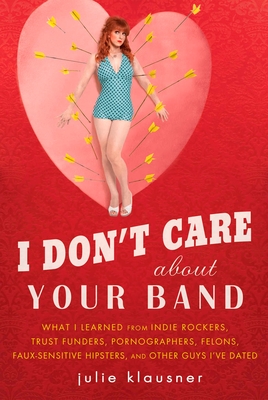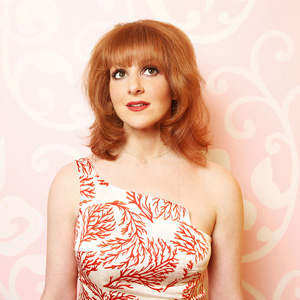by DionysusPsyche

I Don't Care About Your Band: What I Learned From Indie Rockers, Trust Funders, Pornographers, Felons, Faux Sensitive Hipsters, and Other Guys I've Dated is pretty self-explanatory. Julie Klausner takes us on a ride through her life from her childhood dreams of stardom to her adulthood and dating history. While many women might disguise, cover up, and embellish how cool their attitude towards guys was from a young age, Klausner does not pretend to be shy, reticent, and a follower of “the boys have cooties” club. She wants to inform us almost as much as she wants to entertain us. Her sexuality, experiences, and emotional thought process are all for us to laugh and amuse ourselves with. Except for the occasional chagrin at her situations, our laughter is with her not at her.
Julie Klausner is a comedienne and writer for SNL's TV Funhouse and VH1's Best Week Ever. Purusing my local bookstore's comedy section, I knew nothing about her. For all I knew when I picked up her book, she could have been some bum on the street they dressed up for the picture. Upon glancing at the title, I laughed and said, “Yeah, I've felt that way about a guy before.”

It goes without saying, but I'll say it. This book will not teach you anything that will win you a spot on Jeopardy, unless the entire episode is dedicated to what you should or shouldn't learn from someone's love life. Since Rock 'n Roll Jeopardy is as close as it comes, if you're someone who reads books for information and educational purposes (and not merely to guffaw and delight in the schaudenfreud of someone else's love life), then it's probably not for you.
Klausner makes mistakes, and they don't get better as the story continues, they just get more interesting (until the end when Klausner seems to mentally sharpen to her experiences). Sitting through her childhood, I felt like if she threw out the earlier portions of story hour, I could enjoy the rest a little better. It didn't keep me from the full journey, but I wouldn't say it made me enjoy it more. It does make you wonder, based on her childhood and early reactions to boys, what will come of her teenage and college years. Did I say wonder? I meant dread.
It has become an annoying habit of all comediens to include an elementary or junior high “coming of age” chapter. The good news is that the previous chapter talks about Miss Piggy, and the chapter following the “coming of age” describes her gay best friend. Klausner also has an interesting way of writing about extremely personal situations with an almost out of body hilarity. Compared to some of the more outlandish, foul descriptions and language I've heard other comediens use, I was relieved by her wording and take. Reading something that intimate rarely made me shrink in horror but chuckle. She had more long distance online boyfriends than I cared to hear about, but it was fascinating to read about someone who kept meeting people over the internet despite the onesidedness she describes—probably in retrospect. At the beginning of each chapter, I consistently shook my head all the while smiling and said, sometimes aloud, “this can't be good!” I also could have added, and sometimes did, “in bed!”
Despite the clever phrase that a smart person learns from his mistakes and a genius learns from someone else's, this isn't always a lesson that is true for the world of dating. There is no greater proof than Klausner herself. At one point or another, everyone who is young doubts the wisdom of their elders or lacks information necessary that is withheld from one generation to the next concerning matters with the “birds and the bees.” I'm not talking Masters & Johnson's “How to” guide, I am speaking of more simple matters like, “If you have to get drunk to have sex with someone you find unattractive in mind, body, and spirit then you should refrain from drinking with this person, and never have intercourse with them.”

It took a while for Klausner's sense of humor to grow on me. She has some truly memorable lines and unique situations. When she starts describing her ex-boyfriends as “crazy,” “ugly,” or “judgemental” instead of rolling my eyes, I would widen them and get giddy and nervous all at once. At the beginning of it all, I found her annoying and chaotic, like a personality tornado. Fortunately, she becomes more collected and experienced as time goes on. Although I doubted her taste in men, when she called someone a very distinctive adjective, I grew excited for the chapter to unfold.
This book does show important life lessons, but Klausner does not always point them out as such. She makes mistakes that she learns from, and she makes mistakes that she most certainly doesn't learn from. She starts out picking boys like kids pick flowers—just grabbing the ones that are nearby and hoping they look nice in a vase. It is identifiable for those of us who are older and/or wiser. As the book progresses, her attempts at relationships, albeit often horrific and strange, are sought after with genuine desire to be loved and appreciated. To make things better, as her dates become less monstrous and more human, she actually becomes funnier.
While it is pitiful on more than one occasion, there is a certain relief that it didn't happen to you or it's worse than you at your worst. It is also comical to watch her fall into relationship after relationship all the while having a smidge of an idea of how to conduct herself and even less sense of how her counterpart should conduct himself. After Klausner walks away from the most damaging/destructive relationships she learns lessons about love and herself. She grows from her experiences, which is as rewarding for you as it is for her. The result is an enjoyable and amusing read.
By the end, Klausner become decidedly more mature and conscious of the little details in picking a mate which made the earlier more painful parts bearable. She holds no extreme feelings of anger or regret towards any of her exes, and that peaceful attitude was a much needed attribute of the book. More importantly, she learns to love and respect herself which is the message she passes on to the reader. Taking her past in stride and laughing about it at the same time. Her retelling of the past is not at all critical of others, so one can draw their own conclusions. Unlike books like “He's Just Not Into You” or “The Rules,” Klausner knows that everyone goes about love their own way at their own pace. It is what you make it. In conclusion, even though Julie Klausner's love life is messy, it's a fun mess.


No comments:
Post a Comment